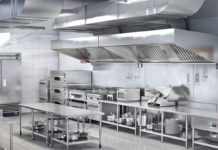The versatility of commercial microwaves can bring real benefits to hospitality businesses

THE commercial microwave oven has played an increasingly important role in pub and restaurant kitchens in recent years, as advancements in technology have enabled it to perform a growing number of functions.
And it’s this versatility – coupled with speed and ease of use – that’s it’s key strength, according to manufacturers and suppliers.
Duncan Vipas, head of sales at RH Hall, which distributes the Sharp and Maestrowave ranges, said commercial microwaves can be used to produce a broad range of dishes “with great results”.
“Today’s microwave ovens are sophisticated yet easy to use and produce excellent cooking results in a fraction of the time it takes to cook foods conventionally and their versatility is underestimated,” he said.
“Many foods and dishes can be cooked very, very well in a microwave oven, with great results.
“The most obvious benefit to any operator is speed, but there is a great deal of versatility that a microwave can offer. Used properly, the microwave will form a key part of the kitchen operation and the ability to serve a full menu.
“Whilst the role of a microwave in the commercial kitchen is not likely to change following lockdown, many operators may find themselves wanting to expand their menus or improve turnaround times and microwaves will certainly play a key role in this, particularly where budgets are limited.
“For operations looking to introduce a simple food offering, the right microwave can help them create a ‘kitchen in a box’ with a small footprint and a minimal budget.”
Choosing the right kind of kit is, of course, key; and operators should look to their food offer to help determine which sort of equipment best meets their needs.
Vipas at RH Hall said: “If the microwave is to be used mainly for simple reheating and defrosting of foods then a straightforward commercial microwave will suffice.
“However, if you wish to reheat and cook food products then a combination microwave oven is well advised.
“Combination microwaves can be used in place of a grill or oven where space is limited, combining these traditional cooking methods with microwave speed for outstanding results – even when cooking foods such as pastries, pies and pizza. Items such as pastry will become soggy if reheated in an ordinary microwave whereas using a combination microwave the crisp, golden brown and conventional finished result will be achieved in microwave time.
“As well as traditional regeneration, microwaves can also be used for steaming vegetables and sauces or gravies.”
The versatility of the commercial microwave was underlined by Jared Greenhalgh, business development manager at Panasonic UK Ltd, who said they can be used to “help expand a menu and give operators the opportunity to offer dishes that may otherwise be time-restrictive or where space is a premium”.
“Choosing the right type of microwave can support a pub kitchen, especially in these post-pandemic times when menus will be evolving over the months to come to meet COVID-relaxing restrictions, and pubs move from a takeaway model to eating in again,” he said.
“Hopefully we have all moved on from assuming a microwave oven is merely for reheating and defrosting, but with multiple companies offering numerous models, it is up to manufacturers to support dealers with the full scope of individual machines and the USPs that can benefit operators.
“Your dealer will have a breadth of knowledge, across a wide variety of equipment, suited to all kinds of operation, so the first stop when considering buying a new microwave would be to ask them for their advice. We believe that our role is one of support and when dealers are in need of detailed guidance, we can be there for operators, to work with them on finding the right model.
“Power capability is only one of the factors we can advise on in order to determine the correct microwave to recommend a customer; the environment of the operation, style of food being served, capabilities of the kitchen staff, time and space limitations of service, turnover of covers and budget are all considerations.”
Power and wattage were also flagged as important considerations by Vipas at RH Hall, who also advised operators to check the warranty being offered. A good quality commercial machine should come with a minimum of one year on site parts and labour warranty, he said, with many of the leading manufacturers now offering up to three years.
And staff training and regular equipment maintenance are crucial to get the most from a microwave.
“With annual servicing in place and by buying a recognised quality brand, there is absolutely no reason why your commercial microwave oven shouldn’t last between three and five years – and even more, dependent on site and on how the oven is cared for,” added Vipas at RH Hall.
“Regular cleaning and servicing are key to ensure users get the maximum lifespan from their microwave.
“When using your microwave on a regular basis, one tip that shouldn’t be overlooked for getting the best from a microwave is regular cleaning – keep the oven’s cavity and inner door clean of food spillage/deposits at all times. This will avoid cavity burn ups and prolong the life of its heart ‘the magnetron’; it will also help the consistency and speed of reheat/cook times.
“Today’s microwave ovens are sophisticated, yet easy to use and produce excellent cooking results in a fraction of the time it takes to cook foods conventionally and their versatility is underestimated.”























